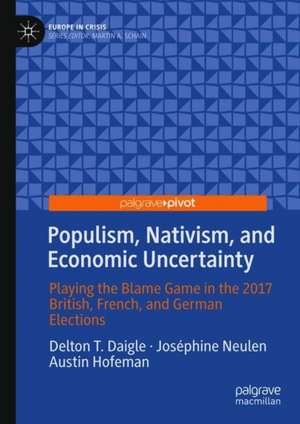Populism, Nativism, and Economic Uncertainty: Playing the Blame Game in the 2017 British, French, and German Elections: Europe in Crisis
Autor Delton T. Daigle, Joséphine Neulen, Austin Hofemanen Limba Engleză Hardback – 27 noi 2018
Preț: 418.67 lei
Nou
Puncte Express: 628
Preț estimativ în valută:
80.11€ • 83.94$ • 66.23£
80.11€ • 83.94$ • 66.23£
Carte tipărită la comandă
Livrare economică 11-25 aprilie
Preluare comenzi: 021 569.72.76
Specificații
ISBN-13: 9783030024345
ISBN-10: 3030024342
Pagini: 164
Ilustrații: XXII, 144 p. 4 illus.
Dimensiuni: 148 x 210 mm
Greutate: 0.35 kg
Ediția:1st ed. 2019
Editura: Springer International Publishing
Colecția Palgrave Pivot
Seria Europe in Crisis
Locul publicării:Cham, Switzerland
ISBN-10: 3030024342
Pagini: 164
Ilustrații: XXII, 144 p. 4 illus.
Dimensiuni: 148 x 210 mm
Greutate: 0.35 kg
Ediția:1st ed. 2019
Editura: Springer International Publishing
Colecția Palgrave Pivot
Seria Europe in Crisis
Locul publicării:Cham, Switzerland
Cuprins
1. Introduction.- 2. Literature Review.- 3. Methods.- 4. France 2017.- 5. Great Britain.- 6. Germany 2017.- 7. Comparing Across the 2017 Elections in Britain, France, and Germany.- 8. Discussion / Conclusion.
Recenzii
“This volume is a valuable contribution to the lively debate on the determinants of rightwing voting in Europe. … I would especially recommend the volume to readers who are relatively new to the research field and in general to scholars to use as a starting point for further research into the interplay of anti-immigrant sentiment, populist attitudes, and right-wing voting.” (Simon Ellerbrock, Democratization, August 28, 2019)
Notă biografică
Delton T. Daigle is an Assistant Professor at George Mason University, USA.
Joséphine Neulen is a graduate student at George Mason University, USA.
Austin Hofeman is a doctoral candidate at George Mason University, USA.
Joséphine Neulen is a graduate student at George Mason University, USA.
Austin Hofeman is a doctoral candidate at George Mason University, USA.
Textul de pe ultima copertă
“Daigle’s, Neulen’s, and Hofeman’s comparative analysis of the 2017 elections in Germany, Britain, and France puts populism in a broader perspective. The breadth of their public opinion data and the leverage of their comparative design allows them to scrutinize systematically some popular explanations for the rise of right-wing populism. This could hardly be more timely.”
—Christopher Cochrane, Associate Professor, University of Toronto, Canada
“This gem of a book is a high-quality investigation into a pressing phenomenon in economically-advanced democracies: the success of the extreme right in France, Great Britain and Germany.”
—Delia Dumitrescu, Lecturer in Media and Cultural Politics, University of East Anglia, UK
This project offers an in-depth look at the three 2017 elections held in Western Europe: France, Germany, and the UK. With events like Brexit and a general rise in right-wing populism across highly industrialized nations, understanding the underlying causes of increasingly extreme electoral behavior is both valuable and prescient. A highly theoretically-focused and current project, it provides a consistent methodological and analytic approach that uses election study data and primary sources to offer a complete and cogent picture of this complex phenomenon as can only found by examining the attitudes and behaviors of the most powerful of democratic participants: the voters.
—Christopher Cochrane, Associate Professor, University of Toronto, Canada
“This gem of a book is a high-quality investigation into a pressing phenomenon in economically-advanced democracies: the success of the extreme right in France, Great Britain and Germany.”
—Delia Dumitrescu, Lecturer in Media and Cultural Politics, University of East Anglia, UK
This project offers an in-depth look at the three 2017 elections held in Western Europe: France, Germany, and the UK. With events like Brexit and a general rise in right-wing populism across highly industrialized nations, understanding the underlying causes of increasingly extreme electoral behavior is both valuable and prescient. A highly theoretically-focused and current project, it provides a consistent methodological and analytic approach that uses election study data and primary sources to offer a complete and cogent picture of this complex phenomenon as can only found by examining the attitudes and behaviors of the most powerful of democratic participants: the voters.
Caracteristici
Provides a contextualized understanding of voting decisions in three crucial elections that took place in Western Europe in 2017 Useful for researchers on both sides of the Atlantic who are interested in electoral research as well as the rise of extremism Draws on direct individual-level survey evidence from national election studies






